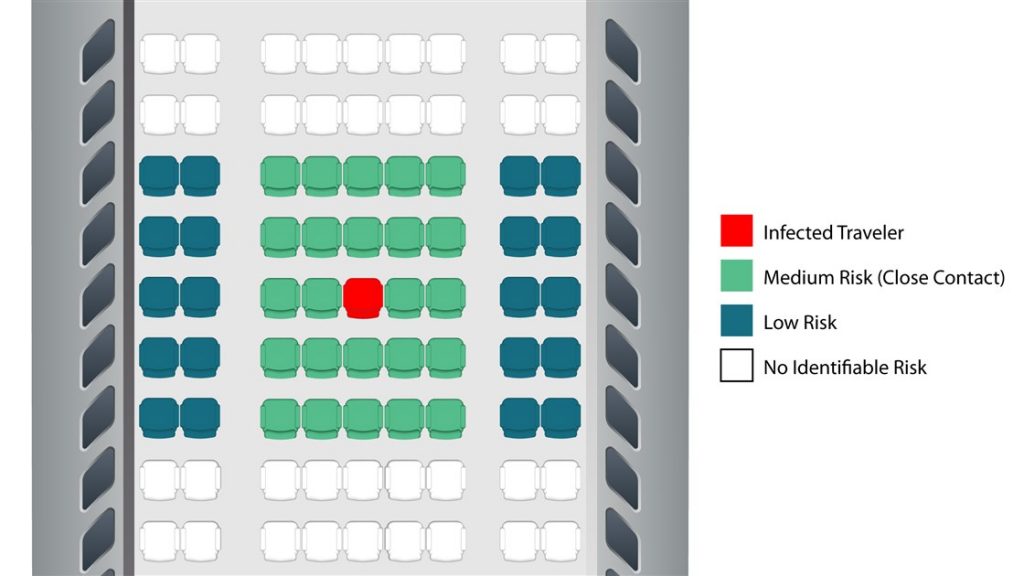Most of us are avoiding unnecessary airline travel in these days, but what about the person who must travel? There are common sense things we can do to build our immune systems and lessen our risk when our jobs, mission, or emergencies require that we travel. When considering the coronavirus risk and duty calls, these are the ten things we must consider and precautions we can take:
- The circulating air is cleaner than you think. According to Emory University Biostatistician Vicky Hertzberg, “The air’s actually pretty clean. It gets recirculated through HEPA filters that really are very good at clearing stuff out. So in some aspects, the air on a plane is cleaner than what’s going on in your new office buildings.” Moreover, Dr. Mark Gendreau, chief medical officer at Beverly Hospital in Massachusetts, says that airlines have a high incentive to keep their ventilation systems well-maintained: “If the HEPA filter is not changed regularly, if the system is not maintained well, it puts a lot of drag on the engines, which will increase the fuel consumption, which is quite an expensive proposition.” So turn those air jets to on to circulate and clean your air.
- The coronavirus is not airborne. It’s transmitted through droplets of fluid or mucus that you cough or sneeze out, which generally don’t travel farther than six feet. But if those droplets land on a surface that you later touch, you can pick up the virus that way. So be aware and be prepared to sanitize those areas. And move away from people who are coughing.
- Don’t touch anything others touch without sanitizing. This means learning to carry sanitation disposable wipes (70 percent alcohol) with you when traveling to wipe down your TV monitor, arm rests, seatbelt buckle, etc. just in case a spot was missed by the cleanup crew. Try to use the bathrooms in the airports that have automatic sinks, dispensers, flushes, etc. but when necessity strikes on the airplane, use a paper towel to flush, turn on sink, and turn doorknob before exiting. Then dispose of it. Use your foot or elbow to open doors when possible.
- Choose the best seat with less exposure. Window seats are best with best circulation and less exposure according to this CDC Map. The last flight I took was only half full, and those of us on it had room to spread out. I know many sites are not recommending face masks, but if you have one, wear it. It does give some protection. As a former cancer patient, I was told to wear the mask to protect me. And it did. but don’t let it give you a false sense of security.

- Increase hydration before, during and after the flight. This keeps your immune system working as God intended. When the flight attendants come by, be the pest who asks for more water. Limit caffeinated and alcohol beverages that only dehydrate.
- Eat lots of fruits, vegetables, healthy fats, clean proteins, and probiotic foods. Increasing these foods and decreasing sugar intake helps to boost your own immune system. A healthy gut increases your chances that your gut lining will take care of invading germs and viruses.
- Get adequate sleep before and after your flight. Don’t let your guard down by missing sleep while traveling. If your long flight causes you to miss a night’s sleep, be proactive and make up for what’s been missed immediately. Your body rebuilds, detoxes and repairs itself when in deep sleep.
- Keep moving with exercise. This increases your B and T cells and overall immune system function. Our lymphatic system functions properly when we move. Its job is to take out the trash in our bodies. Be sure to move before your flight and afterwards to keep your body’s trash removal system working.
- Boost your immune system with vitamins, essential oils, and supplements. Vitamin D is recommended as a great flu and virus fighter (3000-5000 iu). Vitamin C is advised at 3000 mg per day. And zinc at 30 mg. I use a drop of lemon essential oil and a blend of clove, cinnamon, wild orange, eucalyptus and rosemary in water daily to boost my immune system. In addition, I use bone broth protein in my smoothie daily. Elderberry syrup and blueberries help with anthocyanins that increase the immune system.
- Wash, wash, and keep washing your hands. This is the number one recommendation that cuts the risk of spreading in half. But you must wash your hands for 20 to 30 seconds and finger tips, too. Bring travel-size hand sanitizer with you as you travel. When in doubt, do it again!
The CDC advises us to avoid unnecessary travel and especially for the elderly or those with other health complications. The coronavirus is highly contagious. But when duty calls such as the mission God’s called us to, that child we’ve been matched with in a foreign country, or a work or family celebration or crisis, we go with precautions. We keep our immune system strong with lifestyle changes and common sense. The flu is far more prevalent in the US with 32 million cases and 18,000 deaths. And on the worldwide seen, the flu kills up to 646,000 people yearly. So these precautions should be used on a daily basis—not just for coronavirus. Germs, bacteria, flus and viruses are always a threat.
We can also check the following websites for updates:
John Hopkin’s Coronavirus Updates
We had to cancel our trip to Spain where the virus is growing exponentially and Delta did not penalize us. Kudos to them. We feared not being able to get back due to quarantines over getting the virus. But it brought back memories of getting chemotherapy in Chicago and then having to get on an airplane with a compromised immune system. Folks, it can be done. But must be done the right way. Sometimes, duty calls!
What precautions are you putting in place for traveling when it’s necessary?
For Your Health,
Ginny




